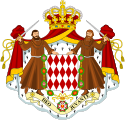Affairs
Though the Crown Council is simply an advisory committee and has no legislative power, the prince must consult it before signing international treaties, dissolving the National Council, naturalizing citizens, or making certain other executive decisions.
At the end of March 2005, the Crown Council carried out what may have been one of its most far-reaching acts. Rainier III, the sovereign prince since 1949, had for some weeks been seriously ill in hospital in Monaco and the Crown Council established that Rainier was temporarily incapable of ruling. (During the period of Rainier III's incapacity, his doctors in Monaco were agreed that his ill health showed little signs of improving and, agreeing with eminent Parisian doctors who were called to give their independent opinions.)
Then-Hereditary Prince Albert was informed of the Crown Council's incapacity finding regarding Rainier III and, following the Constitution, was duly called upon to rule over Monaco as regent.
The Crown Council noted, nevertheless, that if the health of Rainier III were to improve sufficiently, he would be in a position to re-assume his functions as ruler.
Prince Albert's regency lasted but a few days into April 2005, when Rainier III died at the age of 82. He was then formally succeeded as Monaco's sovereign by Albert in his own right as Prince Albert II.

Monaco, officially the Principality of Monaco, is a sovereign city-state and microstate on the French Riviera a few kilometres west of the Italian region of Liguria, in Western Europe, on the Mediterranean Sea. It is a semi-enclave bordered by France to the north, east and west. The principality is home to 38,682 residents, of whom 9,486 are Monégasque nationals; it is widely recognised as one of the wealthiest and most expensive places in the world. The official language of the principality is French. In addition, Monégasque, English and Italian are spoken and understood by many residents.
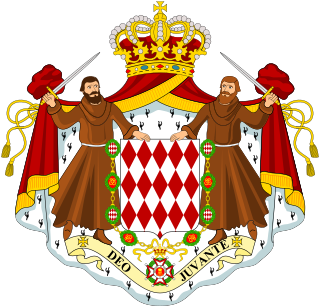
The politics of Monaco take place within the framework of a semi-constitutional monarchy, with the Prince of Monaco as head of state, with some powers devolved to several advisory and legislative bodies.
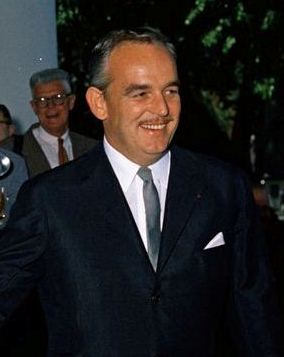
Rainier III was Prince of Monaco from 1949 to his death in 2005. Rainier ruled the Principality of Monaco for almost 56 years.

Princess Antoinette, Baroness of Massy was a member of the princely family of Monaco. She was the elder sister of Prince Rainier III. Her parents were Princess Charlotte, Duchess of Valentinois and her former husband, Count Pierre de Polignac.
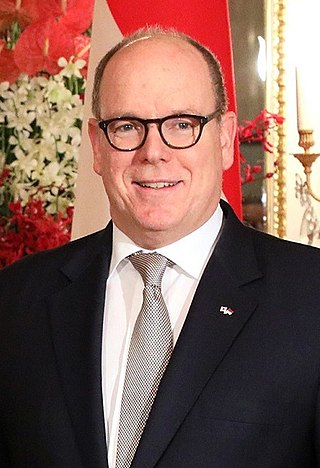
Albert II is Prince of Monaco, reigning since 2005.

Caroline is Princess of Hanover by marriage to Prince Ernst August. She the eldest child of Rainier III, Prince of Monaco, and Grace Kelly, and the elder sister of Albert II, and Princess Stéphanie.

Prince Pierre of Monaco, Duke of Valentinois was the father of Rainier III of Monaco. He was a promoter of art, music, and literature in Monaco and served as the head of the country's delegation to the United Nations Educational, Scientific, and Cultural Organization (UNESCO) and to the International Olympic Committee.

The succession to the throne of the Principality of Monaco is currently governed by Princely Law 1.249 of 2 April 2002.
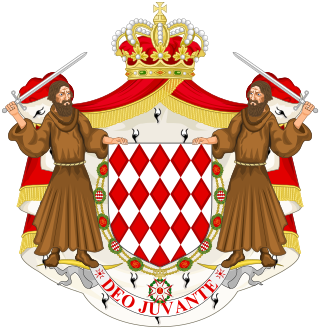
The House of Grimaldi is the current reigning house of the Principality of Monaco. The house was founded in 1160 by Grimaldo Canella in Genoa and became the ruling house of Monaco when Francesco Grimaldi captured Monaco in 1297.
The Regency Acts are Acts of the Parliament of the United Kingdom passed at various times, to provide a regent in the event of the reigning monarch being incapacitated or a minor. Prior to 1937, Regency Acts were passed only when necessary to deal with a specific situation. In 1937, the Regency Act 1937 made general provision for a regent, and established the office of Counsellor of State, a number of whom would act on the monarch's behalf when the monarch was temporarily absent from the realm or experiencing an illness that did not amount to legal incapacity. This Act, as modified by the Regency Acts of 1943 and 1953, forms the main law relating to regency in the United Kingdom today.

The National Council is the unicameral parliament of the Principality of Monaco. Formed in 1911 after the Monégasque Revolution, the National Council initially had 12 members, increased to 18 in 1962 and 24 members since 2002, who are elected from lists by universal suffrage. The National Council is chaired by a president, who was initially appointed by the sovereign prince but has been elected by the National Council members since the year 1962. The current president of the National Council is Brigitte Boccone-Pagès.

The Constitution of Monaco, first adopted in 1911 after the Monégasque Revolution and heavily revised by Prince Rainier III on 17 December 1962, outlines three branches of government, including several administrative offices and a number of councils, who share advisory and legislative power with the prince.

The sovereign prince is the monarch and head of state of the Principality of Monaco. All reigning princes and princesses have taken the name of the House of Grimaldi. When Prince Rainier III died in 2005, he was Europe's longest reigning monarch. The Grimaldi family, which has ruled Monaco for eight centuries, is Europe's longest-ruling royal family.
The Monaco succession crisis of 1918 arose because France objected to the prospect of a German national inheriting the throne of the Principality of Monaco. Prince Albert I had only one legitimate child, the Hereditary Prince Louis, then heir apparent to the principality. As World War I drew to a close, Prince Louis, at the age of forty-eight, remained without legitimate issue, unmarried, and unbetrothed.
Christian Louis de Massy, Baron de Massy is the son of Princess Antoinette of Monaco, Baroness de Massy, and her husband, international tennis champion Alexandre-Athenase Noghès. His grandfather, Antony Noghès, created the world-famous Monaco Grand Prix. He was one of the two page boys at the wedding of his uncle Rainier III with Grace Kelly.

The Monegasque Supreme Court is the highest court of law in the city-state of Monaco for judicial appeals, administrative matters as well as ensuring the constitution of Monaco is upheld. It consists of three full judges and two assistant judges, appointed by the Prince of Monaco at the recommendation of the National Council of Monaco, the Crown Council, the Council of State, the Court of First Instance and the Court of Appeal. This is done in the ratio of one judge per institution. The Supreme Court was established in 1962 following the new constitution to guarantee fundamental liberties.

Franco-Monegasque relations are the special relationship between France and Monaco.

Stéphane Valeri is a Monegasque politician and businessman. He served as the president of the National Council, which is the most powerful elected position in Monaco, between 22 February 2018 and 23 October 2022. He is the former Minister for Social Affairs and Health in Monaco. He served three terms as a National Councillor, and then as its president, but resigned halfway through the second term so that he could serve as a Government Minister.
Jean-François Robillon is a Monegasque politician, writer and doctor, who is currently a National Councillor in Monaco. He previously served as President of the National Council; following the resignation of Stéphane Valeri, Robillon was elected the 11th President by a nineteen to three majority on 11 January 2010. However, in the 2013 parliamentary election, Robillon's coalition, Union Monegasque lost control of the National Council, and as such, Robillon lost his presidency.
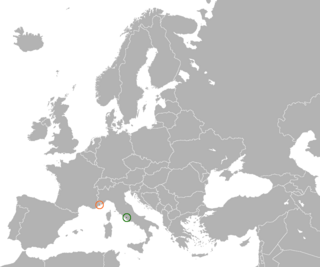
Holy See–Monaco relations are bilateral relations between the Principality of Monaco and the Holy See. The principal Monégasque official is Ambassador Claude Giordan, who officially started at his position in November 2015. The Holy See is represented by its Apostolic Nuncio, Archbishop Antonio Arcari, who assumed office on May 25, 2019. The Embassy of Monaco to the Holy See is located in Rome, on Largo Spinelli. The Apostolic Nunciature to Monaco is non-residing as the nuncio currently resides in Rome.
